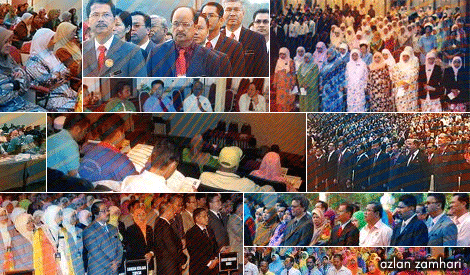To me, the word ‘idiocrat’ is my coinage for writing columns in Malaysiakini since about a decade ago. It describes those with power but falsely assume that “such authority alone” can resolve issues within any modern civil society setting; when others are equally smart, ie, we are all more aware as a community.
The coinage is rooted in two English words: idiot and bureaucrat. Therefore, this compound word would mean any public official, ie those with power and authority, who take ‘legitimate text out of its context’, and thereby abuse all those citizens who know the real difference between truths and lies, within a defined context of any specific issue of concern.
All public officials are usually described as ‘bureaucrats’ and are considered to be rule-followers, but usually never conceived as rule-breakers. ‘Draining the Swamp’ is a phrase used in the American public administration context and seen as an attempt to remove ‘incompetent features’ related to strict-rule-observation versus change-management.
Therefore, in my lexicon and usage of meaning, an ‘idiocrat’ is an unthinking bureaucrat who does not stop to ask why, about the rules that exist, but only seeks to deploy them with little concern for change or improvement. Worse still, they usually forget even the original rationale, but self-justify reasons for the choices they make.
Let me give the one obvious example of this ‘new breed idiocrat’, and a teacher of Islam at that.
How can the mufti of Perlis allegedly abuse all Hindu Malaysians through his public communication, and which has now made him equally infamous? Malaysia is now globally famous for all the wrong reasons.
Let me explain the rational for my questions below related to this ‘idiocrat’; before I consider awarding this mufti, my ‘Idiocrat of the Year Award’ for his most unwise comments or statement.
Premised upon simple logic and Mathematics 101 argument, I ask him the following questions:
Why speak about ‘Hindu governance’ of India and quote irrelevant poems to make generalisations about ‘all Hindus’ when you are obviously not a serious student of comparative religion or international politics?
Moreover, India is in fact a secular state. I had one wise Islamic teacher, Prof SH Nasr at George Washington University (GWU), who also spoke seven languages. All his generalisations were from the three fields of science, religion, and philosophy. Not once did he upset even me. He was an Iranian, Shi’ite, and Sufi at that.
Why does this mufti, as a non-Hindu, choose to run down and abuse the other believers when he has never had their faith experience? That is ignorance and arrogance of the highest order deployed for all to see and witness. Please, therefore, publicly respond to the comments by one Sarala Poobalan who circulated set of questions by WhatsApp.
Does not the Quran say, “To each his own”? Or, what about the other verse that says, “There is no compulsion in religion”? If they do mean what the words say; whither then your locus standi to speak as you did? Moreover, are you not currently the right hand adviser to the Raja of Perlis on matters of Islam? Is your view therefore only a personal one, or also a public one; or both?
Finally, since you are a public official, are you not paid with monies from taxes paid by Hindus and non-Muslims as well? If so, what then is your moral or ethical basis to speak as you did when addressing Hindus in general? As an adviser, or, ‘merely an opinion generator’ for Islam in Perlis; are you really authorised to formally abuse all non-Muslims in your current state of affairs?
Wisdom and fake or false worldviews
The mainstream world of media today thrives on both, fake or false worldviews. The Trumpists have made sure of that. What then are these fake or false worldviews? Can we, as ordinary Malaysians, make a distinction about these ideas and ideals?
When, at the National IT Council we used a framework for a hierarchy of truths, we called it a hierarchy of knowledge. The lowest from of scientific knowledge is called data, or an array of statistics which we can measure and describe any phenomenon.
The next level is called information. That is the deployment of the array of data using statistics to generalise some descriptive or prescriptive dimension about the phenomenon studied. When established beyond doubt and with statistical clarity (usually at 99.5 percent certainty), we call it information which tells us more about that observed phenomenon.
When such accumulated information about any such phenomenon in any observed geography, or in the world of ideas, is applied towards problem solving; we call it knowledge or content ownership or possession. When we do this with any expert code and qualified ethics; we are called a professional worker. Professionalism usually improves problem-solving in any field of life or application.
There is one final step which is called wisdom; the level at which the Perlis mufti failed miserably on. Wisdom is when one has comprehensive knowledge about many fields of knowledge and can point any human into positive directions about life and meanings in life.
In all traditional wisdom and teachings, it is always assumed that a wise person knows the difference between knowledge as a head-only reality, and wisdom as the rights and wrongs about the application of knowledge in matters for all of life.
Only socially constructed?
Are all such life experiences of reality only ‘socially constructed ones’, as per Peter Berger?
Berger and Luckmann introduced the term ‘social construction’ into the social sciences and were strongly influenced by the work of Alfred Schütz. Their central concept is that people and groups interacting in a social system create, over time, concepts or mental representations of each other’s actions, and that these concepts eventually become habituated into reciprocal roles played by the actors in relation to each other.
When these roles are made available to other members of society to enter into and play out, the reciprocal interactions are said to be institutionalised. In the process, meaning is embedded in society. Knowledge and people's conceptions (and beliefs) of what reality is become embedded in the institutional fabric of society. Reality is therefore said to be socially constructed.
My question about fake/false worldviews begs the question if in fact a socially constructed reality has no objective or scientific validity, quite objective and separate of the observers of that reality. Of course they do; within any such a society. That makes for community.
The more important question to me then is: Must such an independent objective existence, external and separate from the perceivers or observers, be accepted as ‘reality’ by all and sundry? That is really up to the independent observers and their perspective or worldviews about life.
Next week: Part 2 - Humpty Trumpty’s incumbent fall
KJ JOHN, PhD, was in public service for 32 years having served as a researcher, trainer, and policy adviser to the International Trade and Industry Ministry and the National IT Council (NITC) of the government of Malaysia. The views expressed here are his personal views and not those of any institution he is involved with. Write to him at [email protected] with any feedback or views.
The views expressed here are those of the author/contributor and do not necessarily represent the views of Malaysiakini.



